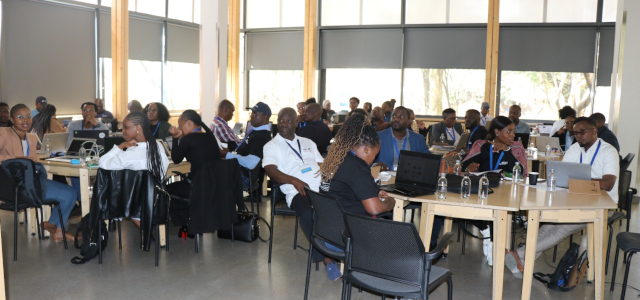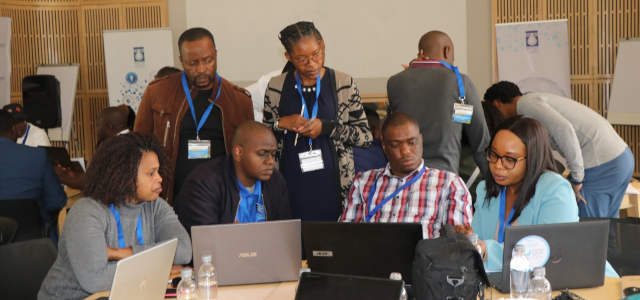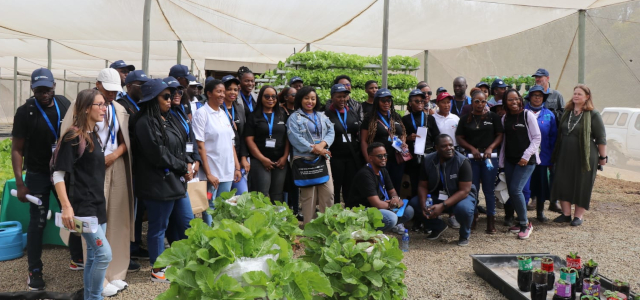Thirty-six participants attended the WEF Nexus Winter School, a capacity-building initiative, held from 14 to 18 August 2023 at Future Africa Campus, in Pretoria, South Africa. These were selected from participants who completed the virtual WEF masterclass, which took place in June this year.

Thirty-six participants attended the WEF Nexus Winter School, a capacity-building initiative, held from 14 - 18 August 2023
GWPSA, together with partners, including the University of KwaZulu-Natal (UKZN), International Water Management Institute (IWMI), Water Research Commission (WRC), United Nations Educational, Scientific, and Cultural Organization (UNESCO), IHE Delft Institute for Water Education, and WaterNet co-convened this third WEF Nexus Winter school, the second in-person training.
GWPSA was among the convenors due to its experience implementing the SADC Nexus Dialogue Project "Fostering Water, Energy and Food Security Nexus Dialogue and Multi-Sector Investment in the SADC Region" funded by the European Commission as part of the Global 'Nexus Regional Dialogues Programme". GWPSA is implementing the project on behalf of the Southern Africa Development Community (SADC).
The project's overall objective is to support the transformation required to meet increasing water, energy, and food security demand in the context of climate change in the SADC region by developing an integrated nexus approach. The project's specific objective is to create an enabling environment that will drive cross-sectoral engagement and the implementation of WEF nexus investment projects that enhance water, food, and energy security in the SADC region.
GWPSA facilitated a session on mobilising finance to implement WEF Nexus solutions, where participants were introduced to different climate funding available and participated in group discussions aimed to develop their skills in developing funding concept notes to access funding. WRC and Tetra Tech also presented ongoing initiatives and open calls for financing Nexus initiatives.
“Finance providers are increasingly concerned with cross-sectoral coherence. WEF Nexus projects are proving to be an efficient way of using resources. It is therefore a strategic means to access finance and more specifically to access climate finance. The WEF nexus approach has opened up new financing opportunities, improved coherence and de-risked investments, and catalysed the implementation of environmentally sustainable and bankable solutions,” explained Dr. Annah Ndeketeya, Programme Officer – GWPSA, as she made a presentation on mobilising finance.
During a Masterclass presentation, Mr. Lot Ndamanomhata, Corporate Communications and ICT Manager - Environmental Investment Fund (EIF) of Namibia, said through the organisation’s efforts, 169 boreholes were rehabilitated and retrofitted with solar pumping systems, 123,000 small-scale farmers have access to fresh drinking water, 40 MW combined installed capacity through solar plant, and a 3 277.6 hectare area is under agricultural conservation. EIF is a GCF-accredited entity serving under the Ministry of Environment, making it possible for national entities to access climate finance.
“Through the implementation of various projects, we have learned that Strategic partnerships can facilitate access to additional funding sources. Joint proposals and projects often attract more significant attention from donors, investors, or government agencies, increasing the chances of securing funding. Strategic partnerships also enable organisations to access diverse expertise and resources that may not be readily available in-house,” he said.
During the week-long training, participants were also introduced to different WEF tools and concepts to apply in their daily work. Among others, one of the facilitators Dr. Sara Masia introduced participants to conceptual mapping and the Hoff Framework to the conceptual model.
The participants also visited the Agricultural Research Council (ARC) Hydroponics, ARC-Vegetable, Industrial, and Medicinal Plants (VIMP) sites to see some of the WEF Nexus technologies.
A Community of Practice was launched during the WEF winter school that will facilitate the continued exchange of Nexus ideas, research, and opportunities and keep the nexus alive.

A Community of Practice was launched during the WEF winter school that will facilitate the continued exchange of Nexus ideas, research, and opportunities
This WEF Nexus Winter School was building on knowledge and skills shared during the virtual WEF Nexus Masterclass, during which SADC indicated the WEF nexus approach was the best way to achieve security in the three areas.
“Integrated planning of water, energy, and food sectors and promoting regional cooperation are our strategies to meet security targets in these sectors & to improve natural resource use efficiencies,” said Mr. Duncan Samikwa, from the SADC Food & Natural Resources Division.
GWPSA was also a part of the June virtual WEF Masterclass where it demonstrated the viability of the water, energy, and food nexus approach through presentations on WEF Nexus demonstration projects in Tanzania, Botswana, Malawi, and Zambia.
“The SADC region continues to suffer from food insecurity yet only 7% irrigation potential has been developed. Access to electricity is at 48%, drinking water at 60%, and sanitation at 40%. There is huge potential to achieve WEF security using natural resources,” explained Mrs. Shamiso Mlilwana, SDG Investment Specialist, GWPSA.
